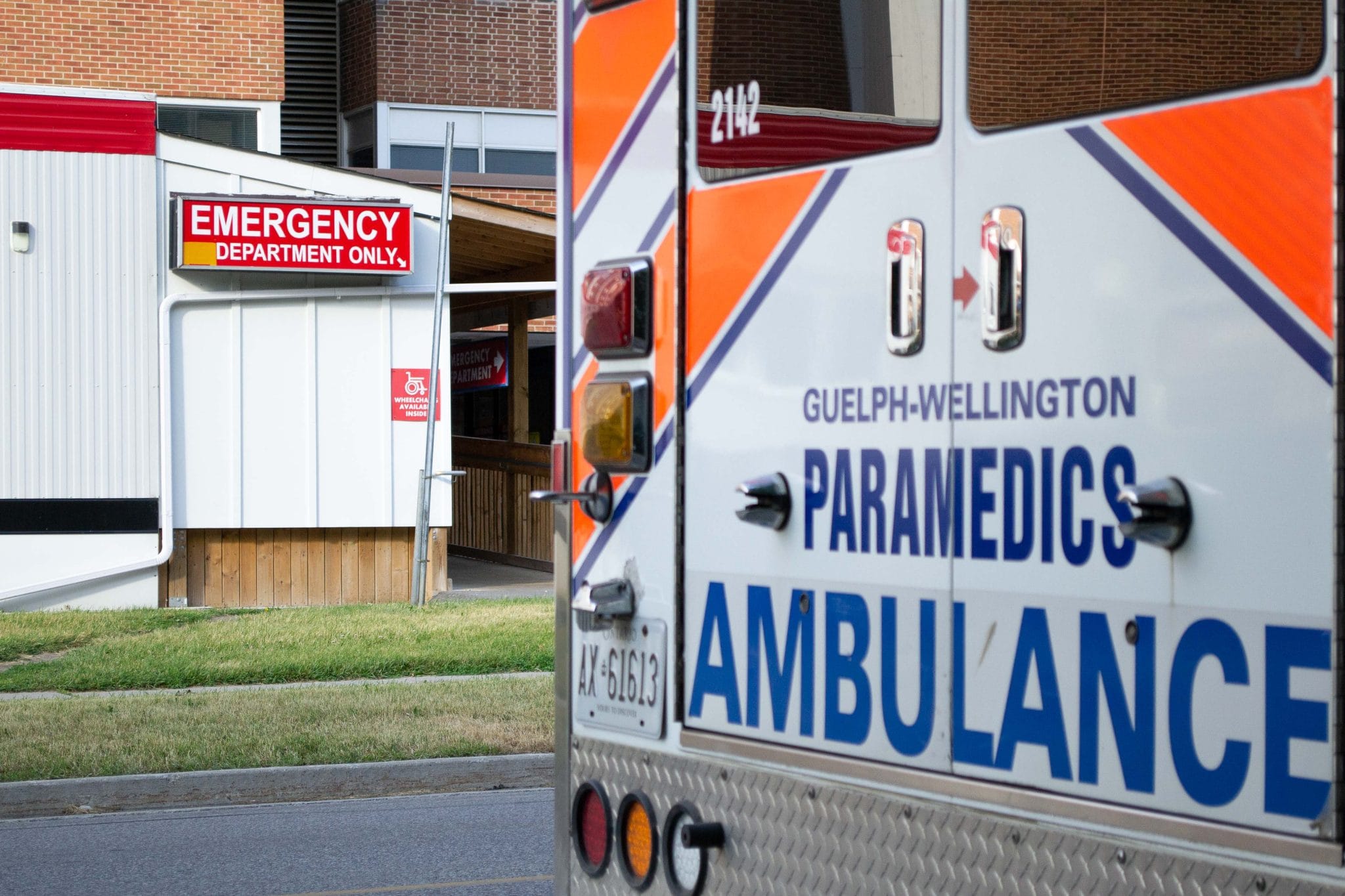GUELPH – Lengthy offload delays experienced at Guelph General Hospital (GGH) by Guelph-Wellington Paramedic Service (GWPS) crews have declined in recent months from last year’s strained highs.
Paramedic service data for 2023, through to August, shows local paramedic crews spent less time in hallways waiting to transfer patients to hospital staff in March, May, June, July and August.
Hospital officials have blamed capacity and constriction throughout the healthcare system for the delays; meaning beds either aren’t available for patients entering the hospital, or for those being discharged to places such as long-term care homes.
Though the hospital is located in Guelph, the burden isn’t felt solely by the city; backups there cause a ripple effect in Wellington County, which is served by the city-operated paramedic service.
In early 2022, the emergency department was so overwhelmed, GGH had no capacity to treat critically ill patients, who were instead transported as far away as Palmerston (almost an hour) and Fergus.
Bottlenecks in Guelph also cause county-stationed ambulances to be called away to replace those stuck in Guelph, in turn causing longer response times to emergencies here as dispatchers shuffle trucks around to balance coverage.
According to dispatch data and the provincial health ministry, offload delays for GWPS crews at GGH began growing in September 2021 before peaking in October 2022. That month, GWPS crews spent a total of 1,315 hours on offload delays.
Although overall offload times remain elevated above past years, recent data shows wait times were lower for some months this year when compared to 2022.
Compared to May and June in 2022, when crews spent more than 1,000 hours on offload delays each month, crews this year spent 309 hours on offload delay in May and 245 hours in June.
“We definitely felt the effects of the reduced offload times beginning in May,” GWPS chief Stephen Dewar stated in an email to the Advertiser.
Improvements range from a reduction in the frequency and length of offload delays, Dewar said, to reduced stress on staff and the service, allowing paramedics to focus on their intended purpose: responding to 911 calls.
In an August press release, hospital officials credited the noticeable reduction in offload delays with workflow planning, emergency department redevelopment planning, and an unhired offload nurse position.
It’s unclear how those three items, all of which involve planning for the future and an unfilled nursing position, have led to any reduction in offload delays this year, but hospital and emergency services officials are celebrating nonetheless.
“For the past several months, Guelph General Hospital and Guelph-Wellington Paramedic Services have been working on strategies to help improve the flow of patients,” chief nursing executive vice president Melissa Skinner said in a statement prepared by a spokesperson for the Advertiser.
An August planning session at the hospital involved frontline hospital and paramedic staff who examined the hospital’s “offload and flow process,” according to Dewar.
“The session provided the opportunity for improved communication and a better, shared understanding of everyone’s positions,” the paramedic chief said, noting future meetings are planned.
Skinner stated staff determined in August that an oversized, single-patient room used for people needing isolation, and located near the hospital’s ambulance bay, could be renovated to accommodate up to three offloaded patients.
Questions about how the hospital would address the privacy of those patients, or how the dedicated isolation room would be replaced, were not answered in subsequent responses to the Advertiser.
The need to respond more quickly to someone’s worsening condition in the emergency department was also addressed at the meeting, according to Skinner, who stated a dedicated phone line will ring directly to the department’s charge nurse for a quicker response.
The hospital has also increased its bed capacity by converting a seventh-floor unit into 12 beds accommodating people with similar care needs, according to a statement from finance and chief information officer vice president Gavin Webb.
“We have also continued to operate 30 additional beds since 2020 with renewed funding to support those requiring inpatient medical care,” Webb added.
Skinner said more patient space upstairs allows patients to be admitted quicker, and opens space in the emergency department.
From the perspective of the paramedic service, Dewar credits the “direct involvement and communication” of new hospital CEO Mark Walton, and the hospital’s senior leadership, for the brief improvement.
“Our challenge will be to maintain these improvements in the face of flu, COVID, and seasonal call volume pressures,” Dewar said.
“We are cautiously optimistic, but we are realistic enough to expect some regression in our progress as the year continues.”
Indeed, August data shows crews spent 411 hours on offload delays beyond the provincial target of 30 minutes, a 95 per cent increase above a yearly low of 214 hours, recorded in July.




